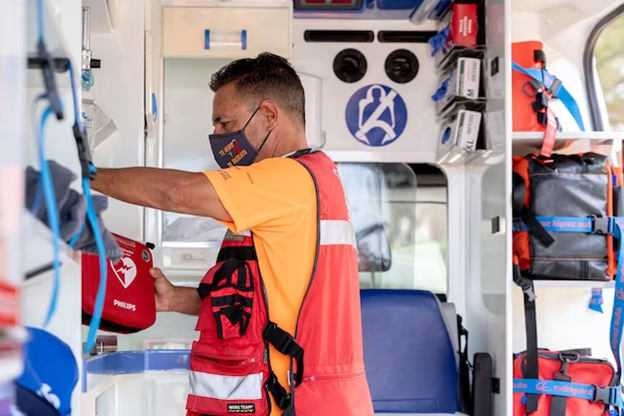Emergency Medical Technician
The program duration may vary but typically spans 1-2 years. Graduates of this program will be prepared for careers as EMTs, working in ambulance services, hospitals, fire departments, and other healthcare settings to provide critical pre-hospital care and transport for individuals in emergency situations.

Diploma in Emergency Medical Technician (EMT)
Prerequisites: High school diploma or equivalent.
Trimester 1: Introduction to Emergency Medical Services
- EMS 100: Introduction to Emergency Medical Services
- Overview of the EMT profession
- Role in providing pre-hospital care and support
- Ethical considerations and professionalism in EMT practice
- APEM 100: Anatomy and Physiology for EMTs
- Basic human anatomy and physiology
- Understanding body systems and functions
- How injuries and illnesses affect the body
- MEDTD 100: Medical Terminology and Documentation
- Learning medical terminology
- Proper documentation of patient care
- Charting and report writing
- EMSIC 100: Safety and Infection Control
- EMT safety practices
- Infection control procedures
- Use of personal protective equipment (PPE)
Trimester 2: Patient Assessment and Basic Life Support
- PASS 100: Patient Assessment and Vital Signs
- Patient assessment techniques
- Measuring vital signs
- Recognizing life-threatening conditions
- AMOA 100: Airway Management and Oxygen Administration
- Airway management and obstruction removal
- Administering oxygen
- Managing respiratory distress
- CCARE 100: Circulation and Cardiac Emergencies
- Recognizing cardiac emergencies
- Basic life support (CPR) techniques
- Automated External Defibrillator (AED) usage
- TWCARE 100: Trauma and Wound Care
- Recognizing and managing traumatic injuries
- Controlling bleeding and wound care
- Immobilization and spinal injury precautions
Trimester 3: Advanced Life Support and Special Populations
- ACLS 100: Advanced Cardiac Life Support
- Advanced cardiac life support techniques
- Medications and defibrillation
- Resuscitation team roles
- PGC 100: Pediatric and Geriatric Care
- Special considerations for pediatric and geriatric patients
- Pediatric emergencies and assessment
- Geriatric health issues and care
- SPEM 100:Specializations in Emergency Medical Services
- Choosing an area of specialization (e.g., paramedicine, wilderness medicine)
- Specialized EMT skills and practices
- Emerging technologies and trends in EMS
Trimester 4: Licensure Preparation and Final Assessments
- EMLPRE 100: Licensure Exam Preparation
- Review of EMT certification exams (e.g., NREMT certification)
- Mock exams and test-taking strategies
- State-specific requirements and regulations (if applicable)
- EMCFE 100: Clinical Rotations and Field Experience
- Clinical rotations in healthcare settings
- Field experience with ambulance services
- Real-world patient assessment and care
- EMFA 100: Final Assessments and Certification
- Successful completion of advanced EMT skills and specialization courses
- Successful performance in any applicable certification exams
- Graduation and award of the Diploma in Emergency Medical Technician (EMT)
Students have to contact the school administration if they want to take extra credits or transfer credits to pursue the Diploma Certificate or Associate of Applied Science (A.A.S.) Degree in their field of interest. Students will select required number courses in each of the areas listed to meet general education requirements graduation for the A.A.S. Some of these courses can be transferred directly from and to the university system and may be substituted for recommended courses on the outline. Students should speak with an advisor before doing so these selective courses are required for all students.
- Selected Communication Course (Choose two for Diploma or three for the Associate)
ENGL 100: Fundamentals of Speech
CPL 100: Career Planning
CPL 101: Communications and Career Strategies
ENGL 101: Composition
ENGL 102: composition
- Selected Mathematics Course (Choose two for Diploma or three for the Associate)
MATH 100:General Math
MATH 101:Intermediate Algebra
MATH 102:College Algebra
- Selected Social Science Course (Choose two for Diploma or four for the Associate)
ECON 105:Leadership
ECON 101:Principles of Microeconomics I
ECON 102:Principles of Macroeconomics II
SOC 101:Introduction to Sociology
PSYC 101: Introduction to Psychology
HIST 101: History
